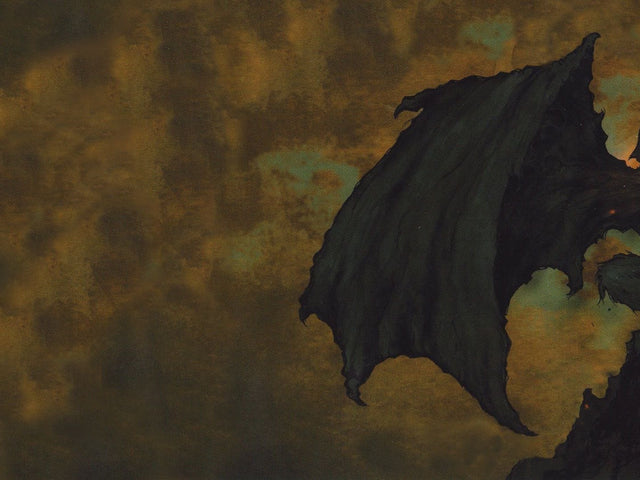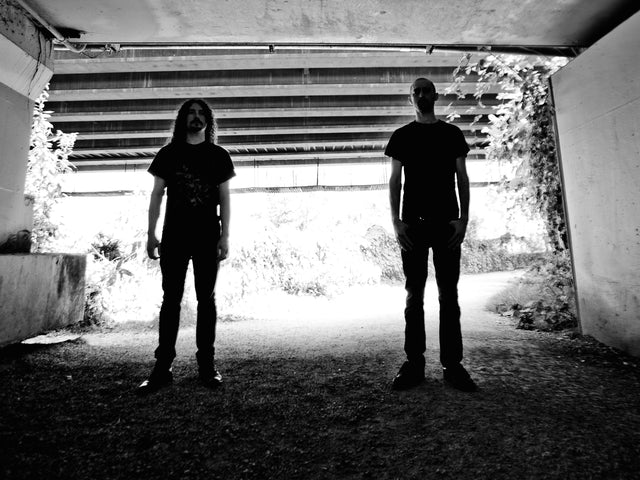Khôrada Summon A Brutal Heat
And The Rest Of The Best Metal In July
Deaf Forever is our monthly metal column, where we review the best in doom, black, speed and every other metal type under the sun.

Khôrada: Salt (Prophecy)
With this brutal heat, I’ve been revisiting Agalloch, the Portland band that was a sublime fusion of black metal, folk and prog. A song like “Falling Snow” is a much needed balm when you make the simultaneous, deliberate choices of living in Texas and basing most of your wardrobe around black band shirts and black skinny jeans, and it’s all the more reason it’s tragic that they’re no longer together. Agalloch guitarist and vocalist John Haughm formed Pillorian not long after the breakup, and though he wasted no time making their debut Obsidian Arc, it did feel like Agalloch’s more metal side with some of the magic missing. The other band to form from Agalloch’s breakup was Khôrada, featuring guitarist Don Anderson, bassist Jason Walton, and drummer Aesop Dekker, with ex-Giant Squid guitarist and vocalist Aaron John Gregory rounding out the lineup. Khôrada doesn’t sound anything like Agalloch, which is why their debut Salt ends up being a more successful record. It does lean closer to Giant Squid’s chamber metal, though Anderson’s prog leanings are all over. He sounds loosened up and liberated, stoked to be in a band again. It’s grounded in metal but not ruled by it; “Edeste” sounds rather jubilant, and “Wave State” has the most recognizable surge and chug, yet it’s lifted off the ground, not weighed down. Khôrada is a rebirth band, and “Water Rights” owes a bit to Celtic Frost’s Monotheist, perhaps the greatest metal comeback record ever. Gregory does a great brooding Tom G. Warrior impression, and the song itself is doom with an art band’s touch, a bigger vision than just crushing riffs. (Nothing wrong with riffs for the sake of riffs, though.) Dekker continues to be one of metal’s most flexible drummers, changing it up from dexterous blasts to softer fills totally in tune. He gives Khôrada fludity, especially in “Seasons Of Salt,” where he tackles black metal and post-Neurosis tranquil with ease. Agalloch may never get back together, but if there’s more Khôrada on the horizon, we can live with that.

Bongripper: Terminal (The Great Barrier)
Chicago’s Bongripper have traveled in a very narrow lane, making instrumental sludge doom that’s also a bit cheeky, indulging in the underground’s inherent silliness. They’re well aware of their limited appeal, knowing that their name won’t endear them to mass success, even when Sleep can pack theaters and surprise release a record on 4/20. Still, I didn’t expect their latest, Terminal, to be so moving. Divided up into two tracks, “Slow” and “Death,” the quartet bring the pummeling, yet the air of death gives the record an overarching mournfulness not seen in their past albums. (Spotify divides it up into several songs — reading SLOWDEATH as an acrostic is some Blood Fire Death-type shit.) They’re committed to the concept of withering away as slowly as possible, their pull going even deeper and doomier. Maybe being too online has me ironically craving the sweet release of death, but Terminal really resonates for that reason, offering slo-mo death as sweet salvation. It’s letting you feel rot like a blackened bath bomb, and how soothing it is. The last five minutes of “Death” are straight up Peaceville Three worship, interjecting gothic melodies and giving the death-doom of Anathema a sludge grittiness. “Slow” also toys with this, coming off like their Chicago peers Pelican’s “Angel Tears,” but with everyone’s tears. As much as I love Sisters of Mercy, I need time to cry.

Sissy Spacek: Ways of Confusion (Nuclear War Now!)
Naw, we ain’t talking Loretta and Doo. This Sissy Spacek is the grindcore project of noise musician John Wiese. They’ve long been on the outer outer edge of grind, and Ways of Confusion is the closest they’ve come to the metal world, thanks to Nuclear War Now putting it out. While that label most specializes in bestial black metal from the likes of Blasphemy and their descendants, they’ve also found success finding metal at its most freaked out. Confusion is 39 songs in 16 minutes, nothing but Wiese’s distorted beyond comprehension bass and drummer Charlie Mumma stuck on permanent blast. Like, if you tried to get him to play a polka beat or something, he would spit out an error message and continue to barrage you to death. “Usain Bolt” is one of the titles, and it also serves as an apt description of just how fast they are. Mumma hitting sticks as a cue sometimes makes up a third or fourth of these tracks. Wiese makes Blacky and Lemmy sound clean and crisp; he conjures outbursts of uncontrolled id through strings rather than actual music. Forget off the rails, there are no rails here. You think you’re a true grind freak? You’re not if you’re not fucking with this record — this is far beyond extreme.

Secret Cutter: Quantum Eraser (Holy Roar)
Imagine if Eyehategod decided to start working out with the singer of Harms Way, and that’s the essence of Bethlehem, Pennsylvania sludge trio Secret Cutter. They’ve got that thick New Orleans tone and bleak outlook, but channel it through muscular hardcore. Quantum Eraser is their second record, and it’s more on edge than their debut Self Titled. Noise bleeds in more, fraying the sharp riffing. They’re still tightly compacted, if even more on the verge of breaking loose. Every breakdown slams much harder, bridging the gap between getting socked at a Hatebreed show and feeling your skin melt from Crowbar’s sweltering riffage. “Bended Knee” stretches out mosh breaks like soot-flavored taffy, and they jerks back into blasting in a snap. “Transient” and “Avalanche” are built around those breakdowns, and they too get warped, building up to sudden falls. It’s brawn through liquid metal, strength through elasticity. While they fit in with similarly low-end-friendly hardcore bands like Vein, Jesus Piece, and Hell to Pay, Secret Cutter is more disassociated-sounding than any of those bands. There’s still an angry heart, you just gotta cut through the exoskeleton to find it.
About the playlist: In addition to selections from this column, I’ve bookended it with two Manilla Road tracks, as a tribute to the recently fallen Mark “The Shark” Shelton, one of America’s truest Metal Gods. There’s some Texas goodies from Skeleton, featured in last month’s column, and Houston’s Skourge. Saw both of them last week in Austin — they’re on tour right now, don’t sleep.
Andy O’Connor heads SPIN’s monthly metal column, Blast Rites, and also has bylines in Pitchfork, Vice, Decibel, Texas Monthly and Bandcamp Daily, among others. He lives in Austin, Texas.
Related Articles
Join the Club!
Join Now, Starting at $44Exclusive 15% Off for Teachers, Students, Military members, Healthcare professionals & First Responders - Get Verified!







